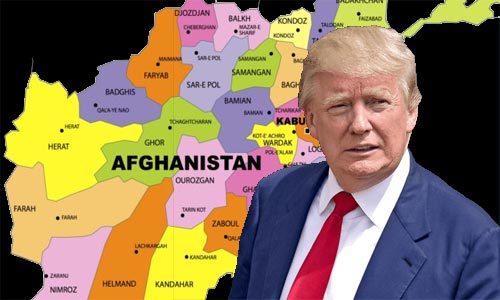In his Wednesday’s remarks, US President Donald Trump said Pakistan and Russia should fight in Afghanistan not the US. He also gave a historically garbled account of Moscow’s experience in the country and suggested that the US should not follow the former Soviet Union’s footsteps by draining its resources here.
Trump, who called his just-departed defense secretary James Mattis as “great military genius” in December 2017, disapproved of him in his remarks. “I am not happy with what he done in Afghanistan, and I shouldn’t be happy,” he said.
Trump’s remarks seem to have incensed many Republicans and US generals who supported the US’ military presence in Afghanistan.
Trump’s endorsement of the former Soviet Union invasion has likely hurt the feelings of Afghans, mainly Mujahedeen, who paid heavy sacrifices in the fight against the Soviet Union. Moscow invasion of Afghanistan resulted in heavy destruction and casualties in the country and sowed the seeds of civil war. Despite Trump’s statement, there was no issue of terrorism in 1970s or 1980s and Afghanistan posed no threat to the region or its neighboring countries. Terrorism and al-Qaeda emerged in Afghanistan in 1990s with the Taliban’s regime. Hence, the Soviet Union, which spilt the blood of millions of Afghans, including women and children, and wreaked havoc on country’s infrastructure, economy and culture, violated international and humanitarian law. Soviet Union committed war crime in Afghanistan with impunity. Endorsing the Soviet invasion of Afghanistan is equal to supporting the violation of human rights and humanitarian law and underestimating a decade of jihad carried out by Afghan people.
On the other hand, Afghans will not allow Pakistan to fight in Afghanistan’s soil. Pakistan, along with Saudi Arabia and UAE, officially recognized the Taliban’s regime. Mistrust between Kabul and Islamabad persists following years of blame game.
Meanwhile, a sense of sensitivity against Russia still lingers in Afghanistan. That is, a number of Afghans tend to view Russia from the 1980s perspective. Russia’s military inference in Afghanistan is not acceptable to Afghan nation or state. The horrible consequences of Soviet Union invasion of Afghanistan is still felt in the country. The war imposed by the Soviet forces completely dismantled the country.
The irony is that last year Trump said that “Pakistan often gives safe haven to agents of chaos, violence and terror” while declaring his strategy about Afghanistan and South Asia, this year, however, he says Pakistan should fight in Afghanistan to combat terrorism.
Referring to last year’s bloody attack in Barcelona, Trump repeatedly warned against the horrible “consequences of a hasty withdrawal”, but this year he seems inclined to reduce the number of troops in Afghanistan. This U-turn in Trump’s strategy within a year is astonishing for observers of Washington.
It is self-explanatory that terrorism is a global threat. Therefore, all world powers, including Russia and Pakistan, have to combat terrorism to stabilize the globe and put an end to violence and bloodshed. Afghanistan, however, is the main casualty of terrorism. If Afghanistan’s neighboring countries fear the spillover, they have to seek a political solution to the ongoing crisis in the country. Kabul government has consistently urged Pakistan to combat terrorism in its own soil and support Afghanistan through bringing the Taliban to the negotiating table with Kabul representatives. Kabul will also welcome Russia’s role in peace talks since both Russia and Islamabad believe that military deal will not lead to peace in the country.
It should be noted that the US war on terror is not similar to that of the Soviet-Afghan War. The Soviet Union sough to shore up its pro-communist puppet government and expand its influence through the use of force. All Afghans, with few exceptions, were against the invasion and the US sided Afghans in that historical fight.
All in all, the unmitigated insurgency has frustrated Afghan people. It is believed that if regional powers combat terrorism with genuine intention and eradicate their financial resources and safe havens, terrorist networks will be dismantled. To eliminate terrorism, the US and its allies should pressure regional powers to counter insurgency indiscriminately and target their safe havens wherever they are.
Likewise, the US withdrawal in the current critical situation is not recommended. Trump should review his statements he made last year, “The vacuum we created by leaving too soon gave safe haven for ISIS to spread, to grow, recruit and launch attacks. We cannot repeat in Afghanistan the mistake our leaders made in Iraq”.

